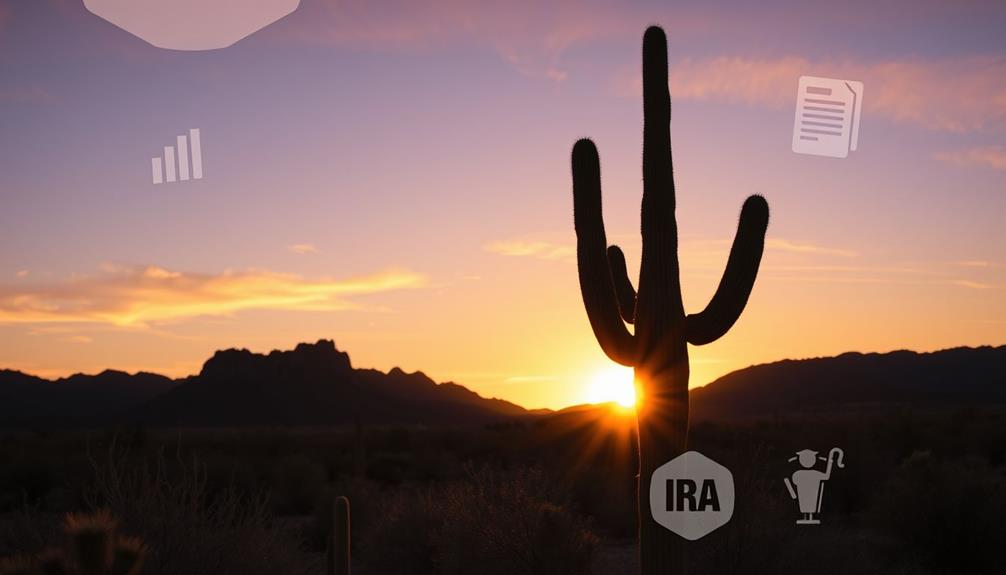In Arizona, withdrawals from your IRA are subject to full taxation at a flat income tax rate of 2.5%. This means that when you withdraw money, it will directly impact your taxable income. However, Social Security benefits are not taxed by the state, which can help alleviate some of the tax burden, particularly if planned out wisely. Understanding your total income can help you avoid moving into a higher tax bracket. By timing your withdrawals carefully and seeking advice from a financial advisor, you can significantly reduce the overall tax impact. For more valuable insights on navigating these tax implications, continue reading ahead.
Key Takeaways
- Arizona imposes a flat income tax rate of 2.5% on all taxable income, including IRA withdrawals.
- Social Security benefits are exempt from Arizona state income tax, providing financial relief for retirees.
- Strategic timing of IRA withdrawals can minimize overall tax liability, especially during low-income years.
- Utilizing available tax deductions and credits can further reduce the tax burden for low-income retirees.
- Consulting a financial advisor is recommended to tailor withdrawal strategies and optimize tax outcomes.
Understanding Arizona's Tax Structure

When you withdraw funds from your IRA in Arizona, it's important to understand how the state's tax structure affects your finances. Arizona implements a flat income tax rate of 2.5% starting from 2023, which applies to all taxpayers, including those of you making IRA withdrawals. Since these withdrawals are considered taxable income, you'll need to account for this rate in your financial planning.
Additionally, the average property tax rate in Arizona stands at 0.63% of assessed home value. This can impact your overall budget, especially if you're relying on IRA funds for living expenses.
The state also has a sales tax rate of 5.6%, which can rise to around 8.37% with local taxes. This means your spending after IRA withdrawals could be greatly affected.
However, there's some good news: essential items like groceries and prescription medications are exempt from sales tax in Arizona. This exemption provides financial relief, helping you manage your retirement income better.
IRA Withdrawals and State Taxes

Understanding how IRA withdrawals are taxed in Arizona is vital for effective financial planning. In Arizona, IRA withdrawals are taxed as regular income at a flat rate of 2.5%. This means you need to take into account how these withdrawals will impact your state income tax and taxable income during retirement. Unlike Social Security benefits, which are exempt from state taxes, all distributions from traditional IRAs are subject to taxation.
Here's a quick overview of how IRA withdrawals affect your tax situation:
| Factor | Implication |
|---|---|
| Withdrawal Type | Traditional IRA |
| State Income Tax Rate | 2.5% flat rate |
| Social Security Benefits | Exempt from state tax |
| Capital Gains Deduction | Not applicable to IRAs |
| Impact on Total Income | May affect your tax bracket |
As you plan your retirement income strategy, keep in mind that withdrawing from your IRA could push you into a higher tax bracket, affecting your overall tax liability in Arizona. It's important to factor in these elements for a smoother financial future.
Tax Treatment of Retirement Income

Tax treatment of retirement income can greatly impact your financial strategy in retirement. In Arizona, IRA withdrawals are treated as regular income, and you'll face a flat tax rate of 2.5% for the year 2023.
Unlike Social Security benefits, which aren't subject to Arizona state tax, your IRA distributions will be fully taxable. This means you need to carefully consider how much you withdraw since these amounts contribute to your overall taxable income.
While you might benefit from deductions on federal pension income, this doesn't extend to IRA withdrawals. Higher total income can push you into a higher tax bracket, increasing your overall tax liability.
As a result, it's vital to engage in proactive financial planning to manage your retirement income effectively. To minimize the tax burden on your retirement income, think about strategic withdrawal methods.
Without specific exemptions for IRA distributions in Arizona, how you manage these withdrawals can greatly influence your tax situation. Remember, effective financial planning today can lead to a more secure and enjoyable retirement tomorrow.
Implications for Social Security Benefits

In Arizona, you won't have to worry about state income taxes on your Social Security benefits, which can ease your financial burden.
However, keep in mind that federal taxes might still apply, so you'll need to factor that into your overall retirement income planning.
Understanding these implications is essential for making the most of your IRA withdrawals and ensuring a stable financial future.
State Tax Exemption Overview
For retirees in Arizona, the state's complete exemption of Social Security retirement benefits from income tax offers substantial financial relief.
This state tax exemption makes Arizona an attractive destination, especially for those relying heavily on Social Security benefits as their primary source of retirement income. Unlike other forms of retirement income, which are subject to Arizona state income taxes, your Social Security benefits remain untouched by the state's flat income tax rate of 2.5%.
It's important to remember that while you won't pay state taxes on your Social Security income, federal taxes may still apply based on your overall income levels. This means planning your finances carefully can help you maximize your benefits.
Additionally, Arizona boasts relatively low property tax rates, averaging just 0.66%, further enhancing its appeal for retirees seeking financial relief.
Federal Tax Considerations
Understanding the federal tax implications of Social Security benefits is essential for retirees, especially in light of how your overall income can influence what you owe.
Your combined income plays a significant role in determining the taxability of your benefits. Here's what you need to know:
- Combined Income Thresholds: If your combined income exceeds $25,000 (or $32,000 for couples), up to 85% of your Social Security benefits may be taxable.
- Reporting IRA Withdrawals: Any IRA withdrawals you make are considered part of your combined income, which can impact the taxability of your Social Security benefits.
- Arizona State Income Tax: While Arizona doesn't impose state income tax on Social Security benefits, you'll still need to be aware of federal taxes.
- Consult a Financial Advisor: It's wise to consult a financial advisor or tax professional to navigate these complexities and optimize your retirement income.
Planning for Retirement Income
When planning for retirement income, it is crucial to take into account how your Social Security benefits interact with other sources of income, particularly in Arizona. Social Security benefits are exempt from Arizona income tax, giving you a distinct advantage. However, keep in mind the federal tax implications, as some individuals may owe taxes based on their total income.
Here's a quick overview of tax implications for various retirement income sources in Arizona:
| Income Source | Arizona Income Tax Status | Federal Tax Implications |
|---|---|---|
| Social Security Benefits | Exempt | Possible tax on higher incomes |
| IRA Distributions | Subject to 2.5% tax | Taxed as ordinary income |
| 401(k) Distributions | Subject to 2.5% tax | Taxed as ordinary income |
Effective financial planning involves optimizing the tax impact of your Social Security benefits and other retirement income. Additionally, consider utilizing low-income tax credits available to retirees, which can help reduce your overall tax liabilities despite withdrawals from retirement accounts. By strategically planning, you can enhance your financial stability in retirement.
Strategies to Minimize Tax Liability

To minimize your tax liability on IRA withdrawals, timing is key.
You can also take advantage of tax deductions to lower your taxable income.
Consulting a financial advisor can help you create a tailored strategy that takes your unique situation into account.
Timing of Withdrawals
Many retirees find that timing their IRA withdrawals can markedly impact their tax liability. In Arizona, where the flat income tax rate is 2.5%, being strategic about when to withdraw can help you stay within lower tax brackets.
To enhance your tax efficiency, consider these strategies:
1. Withdraw during low-income years: If your income from pensions or Social Security benefits is low, it's a good time to withdraw from your IRA, minimizing your overall taxable income.
Additionally, understanding common financial terms can help you make informed decisions regarding your retirement planning.
2. Plan around Social Security: Since Arizona doesn't tax Social Security benefits, withdrawing from your IRA in those years allows you more flexibility.
3. Utilize long-term capital gains deductions: If you've acquired assets after Dec. 31, 2011, take advantage of the 25% deduction on long-term capital gains alongside your IRA withdrawals.
4. Consult financial advisors: Engaging a financial advisor can help you develop a withdrawal strategy that considers potential changes in tax law and personal income levels over time.
Utilize Tax Deductions
Strategic planning for IRA withdrawals can greatly reduce your tax liability, especially in a state like Arizona where withdrawals are taxed as regular income at a flat rate of 2.5%.
To minimize the impact of Arizona state taxes, consider utilizing available deductions. For instance, retirees can benefit from a $2,500 deduction on federal pension income, which can lower your taxable income if incorporated into your withdrawal strategy.
If you're a low-income retiree, don't overlook tax credits that can further decrease your overall tax liability, making your IRA withdrawals more tax-efficient.
Additionally, if your IRA funds are invested in long-term capital gains assets acquired after December 31, 2011, you could take advantage of a 25% deduction on those gains, providing another layer of tax relief.
Navigating income tax brackets effectively is essential. By timing your withdrawals and understanding how deductions apply, you can optimize your tax situation.
It's wise to consult a tax professional who can help you identify the best strategies for your specific circumstances, ensuring you minimize potential tax consequences and maximize your retirement income.
Consult Financial Advisors
When steering through the complexities of IRA withdrawals, consulting a financial advisor can be a game-changer for retirees looking to minimize tax liability. In Arizona, where the flat income tax rate is 2.5% effective from 2023, employing tax-efficient withdrawal strategies is essential.
Here are some ways financial professionals can help you:
- Analyze Income Sources: Advisors can assess your overall income and recommend ideal withdrawal strategies to avoid higher tax brackets.
- Stagger Distributions: By staggering your withdrawals, you can preserve tax benefits and maintain a more favorable tax position.
- Roth IRA Conversions: Financial advisors can guide you through converting traditional IRA funds to Roth IRAs, allowing for tax-free withdrawals later.
- Identify State Tax Credits: They can pinpoint available state tax credits and deductions, enhancing your tax situation by leveraging exemptions for certain retirement incomes.
Regular consultations with financial professionals guarantee that your withdrawal strategies adapt to changing tax laws and personal financial circumstances.
This proactive approach not only maximizes your retirement income but also enhances your financial stability in retirement.
Key Deadlines for Tax Filings

Understanding key deadlines for tax filings is essential for guaranteeing compliance and avoiding penalties. In Arizona, the tax filing deadline for state income tax returns in 2024 is April 15, which aligns with the federal submission deadline.
As a taxpayer, if your income exceeds $13,850, or if you're married and your combined income surpasses $27,700, you'll need to file your taxes.
It's important to remember that part-time residents must file and pay taxes on their global income during their residency period.
While you can request extensions for filing, be aware that these extensions don't apply to tax payments, which remain due by April 15.
To prepare for your filing, make sure you have all necessary documents, like 1099s for IRA withdrawals, ready by the end of January. This preparation will help you accurately report your income and avoid any last-minute rush.
Staying organized and aware of these deadlines will guarantee you meet your obligations without incurring penalties, allowing you to focus on your financial planning instead.
Resources for Financial Planning

For effective financial planning, tapping into available resources can make a considerable difference in managing your retirement strategy. In Arizona, you have several tools at your disposal to guarantee your retirement income is optimized while maneuvering through Arizona taxes.
Here are four key resources to take into account:
- AARP's Retirement Calculator: This tool helps you estimate your retirement income and plan accordingly.
- Tax Calculator: Use this to project your annual income taxes, aiding your financial planning efforts.
- Senior Property Valuation Protection Program: This program helps eligible seniors manage property taxes by freezing the taxable value of their primary residence for three years.
- Consultations with Tax Professionals: Regular meetings with tax professionals can keep you informed about changing laws and their implications on IRA withdrawals, ensuring you maintain tax efficiency.
Additionally, don't overlook the various tax credits available for low-income retirees, which can notably reduce your tax liabilities on retirement income.
Frequently Asked Questions
Are IRA Withdrawals Taxed in Arizona?
Yes, IRA withdrawals are taxed in Arizona. Traditional IRA distributions face a flat state income tax rate of 2.5%, while Roth IRA withdrawals can be tax-free if certain conditions are met. Check your eligibility.
Do You Pay State Income Tax on IRA Withdrawals?
Yes, you pay state income tax on IRA withdrawals. You'll face a flat rate, so you'll need to plan. Consider your overall tax situation, because effective strategies can help you minimize your tax liability.
What Tax Breaks Do Seniors Get in Arizona?
Seniors in Arizona enjoy several tax breaks, including exemptions on property taxes, deductions on retirement income, and complete exemptions on Social Security benefits. These measures help you manage living expenses and enhance financial security.
What Is the Arizona Pension Exclusion?
Have you heard about the Arizona Pension Exclusion? It lets you deduct up to $2,500 of federal pension income from your taxable income, easing your tax burden if you're a qualifying Arizona resident.
Conclusion
In Arizona, understanding the tax implications of your IRA withdrawals can save you money and stress. By staying informed about state tax structures and retirement income treatment, you can craft strategies to minimize your tax liability. Remember, "an ounce of prevention is worth a pound of cure." Take the time to plan and consult resources to guarantee you're making the most of your retirement income while keeping your tax obligations in check. Your future self will thank you!









